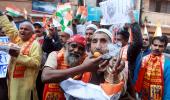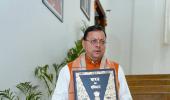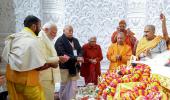'There is something in our desh ki mitti that has held us together.'
'So many conquerors, colonisers, cultures came and went, but we withstood them and rose up again.'

The Waqf Board office in Dehradun is a neat building with a large open ground in the premises where a group of men are standing in the winter sun. Shadab Shams's office is down a corridor on the first floor. Shams is the chairperson of the Waqf Board of Uttarakhand which functions under the Central Waqf Act and is a statutory body under the aegis of the state government.
Above his chair are framed pictures of President Draupadi Murmu, Prime Minister Narendra Modi, state Governor Lieutenant General Gurmit Singh (retd) and Chief Minister Pushkar Singh Dhami. An orange towel is draped on the back of his chair, a replica of the Kaaba in Mecca is placed on his table, beside a computer and printer along with an invitation to a recitation of the Ramayan and a copy of the Milli Times newspaper.
A police constable and the editor of a local Muslim paper accompany him as he enters the office.
The scholar, chairman and member of the Bharatiya Janata Party recently said that Uttarakhand will make four modern madarsas that will teach the NCERT syllabus, including Sanskrit as a subject. The first of the modern madrasas is expected to start functioning by March.
"Along with Hafiz-e-Quran, Muslim children will learn about Shri Ram, Krishna, Yeshu, Bhagwan Mahavir, we will teach about our idol Mohammad Sahab and all the great men of other religions as well," he says.
"The children from madarsas should become doctors, engineers, scientists and walk in the footsteps of A P J Abdul Kalam. That is why we have named the modern madarsas after Dr Kalam," he says.
"Nationalism will be taught at the modern madarsas. Our children are ready to sacrifice their all for Ma Bharti," Shadab Shams tells Rediff.com's Archana Masih.
Was the incident that happened in Haldwani on Waqf or private land?
It was nazul land [reversion of property to the state or property of the government]. I feel it is a conspiracy to obstruct the UCC. The bill was passed smoothly and this is an attempt to create problems.
What are the proposed changes proposed in the madarsas? How will the modern madarsas that the Waqf Board in Uttarakahand is planning to build be different?
We have separated the madarsas from the Waqf board. The work of Waqf is to look after idgah. graveyards, mosques etc -- property used by Muslims is called Waqf for user. There are 117 madarsas that are the property of the Waqf board in Uttarakhand.
We realised that we are not working hard enough on the education of Muslim children. So, we decided that we will convert these into model madarsas. In phase I, we have decided to start with making four modern madarsas in Dehradun, Udham Singh Nagar, Nainital and Haridwar. We will follow the NCERT syllabus in the modern madarsas.
Most students in madrasas are poor, many are orphans -- don't they have the right to join the mainstream of the nation?
It is not the job of the Waqf Board to run madarsas, but we said that we will try as a model because mere talking is not going to help.
You have said the syllabus will include stories and lessons from the Ramayana which has received both support and criticism from Muslim scholars?
Along with Hafiz-e-Quran, Muslim children will study the NCERT syllabus. The new syllabus will also include Sanskrit as a subject.
Then we were asked whether the teaching of Sanskrit will also include Shri Ram, I said we will teach that also. We said we will teach Shri Ram, Krishna, Yeshu, Bhagwan Mahavir, we will teach about our idol Mohammad Sahab and all the great men of other religions as well.
Shri Ram personifies an ideal for India -- a man who sacrificed his kingdom and went into exile to honour his father's vow. Who will not want a son like him and why should we not teach a lesson like this?
The teaching will not be confined to just the Quran. The children from the madarsas should become doctors, engineers, scientists and walk in the footsteps of A P J Abdul Kalam. That is why we have named the modern madarsas after A P J Abdul Kalam.
The madarsas will be steeped with nationalistic, Nation First thinking. Nationalism will be taught here. We will also have a retired colonel to provide physical training to the students.
Our children from the madarsas are ready to sacrifice their all for Ma Bharti. They will know that they too have to go and fight for the country and sacrifice their life for the nation's honour. That is the thought process we want to inculcate.

What is the curriculum being taught in the madarsas now?
The syllabus of the Madarsa Board is taught in the madrasas under the guidance of a maulana and mufti. Even if the Madarsa Board tries to add other subjects, it is not binding on them to include the new subjects in the curriculum. They are not compelled to include it; if they were willing, then this change would have happened much earlier.
Our idea is to prepare a model and present it -- and if it is liked it can be followed. Once we have made the model, I am certain that people will accept it.
I hail from the Muslim community. I will not want any harm or adverse affect on my community.
This nation has given us the Constitutional right to worship any faith, any God, but you have to respect your ancestors and elders and think of them as your idols.
The prime minister has said India has to become Vishwa Guru. We will only achieve that when Hindus and Muslims together take the lead.
When Indian Muslims show the world that this is what Islam is and the world should learn from us.
When Indian Christians show the world that be Christians like us.
When Indian Sikhs show the world that no one else can be a better Sikh than us.
Only then will we be able to tell the world that we have the capacity to become Vishwa Guru.
We have to be the best version of ourselves. For that to happen, we have to adopt change. We have to correct our drawbacks within our own religions and move forward with nationalistic thinking and fulfil the dream of being Vishwa Guru.

What are the things that need to be left behind and what are the corrections needed?
The malpractices or issues that lead to friction. How long will we destroy and rebuild?
Let us leave the past behind -- Chodo kal ki baatein, kal ki baat purani, naye daur mein likhenge, mil ke nai kahani, hum Hindustani.
Let's move ahead with new thoughts; how long will we keep talking about past grievances?
The Quran says you follow your religion and I will follow mine. Religion is adopting the good. Let us adopt the good from all religions.
Like Iqbal's words in Sare Jahan se Accha say:
Yunan o Misr o Ruma, sab mit gaye jahan se,
ab tak magar hai baki namo nisha hamara,
kuch baat hai ki hasti mit ti nahi hamari,
sadiyon raha hai dushman, daure zama hamara.
There is something in our desh ki mitti that has held us together. So many conquerors, colonisers, cultures came and went, but we withstood them and rose up again.
In 77 years, we have made such progress that we can work towards being Vishwa Guru which itself shows that there is something unique in the mitti and paani of Bharat.
If we all walk together, we will create a beautiful Bharat and we are doing this sincerely under Modiji.
There are some problems that will arise. Some feel they have been marginalised, but that is a misconception.

How will the Uniform Civil Code impact Muslims?
A uniform law for everyone is a step in the right direction. It is something the framers of the Constitution had envisioned for India where a citizen is not seen through the lens of her/his religion. That can happen only when there is one law for everyone.
People are concerned that there will be interference in their religious customs. But there is no interference. The Christians will do their church wedding, Hindus will do their pheras, Muslims will do their nikaah and all will get it registered.
If the UCC could damage religion, then why would developed countries like America, the UK, France, Germany have a uniform civil law?
Their mosques, temples and churches don't have loudspeakers on these structures -- each one does their own ibadat [worship] but don't disturb the other. There is uniformity, and aren't Muslims, Sikhs, Hindus living there? The priority must be nation first.
We have to have to inculcate such enlightened thoughts if we have to progress. If we don't do that, then we are not being fair to our country. We have the best civilisation. Our culture and sabhyata comes from Shri Ram.
We will assimilate the best of Ram and of our Auliyas [saints] and move towards making a beautiful Bharat. An India where we don't disrespect any religion or any faith.
The intention is clear. The intent is good.











 © 2025
© 2025